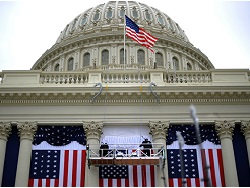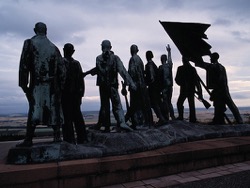
An open letter to the presidential candidates
Dear candidates!
The United States is based on the principles of life, liberty and the pursuit of happiness. For many years the promotion of democracy and human rights around the world were in the spotlight of American foreign policy. The United States must maintain relationships with many autocratic foreign States, however, there are very good reasons why most of our closest allies is a democratic country.
Free countries — economically more successful, more stable and more reliable partners of the USA. A democratic society is unlikely to initiate aggression and to wage war against his neighbors and own people. These States are less likely to become insolvent, the less it is likely to turn into a hotbed of instability and terrorism that we see for example in Syria. This means that promoting democracy serves U.S. interests and promotes order and peace throughout the world.
Over the past four decades the number of free and democratic countries has more than doubled. People in Latin America, Central Europe, East Asia and sub-Saharan Africa give preference to responsible and accountable power. This remarkable progress is founded on the universal desire for freedom and dignity — but it has also become possible due to the powerful support that America under the leadership of both parties has human rights and democracy. Such support is not only a means of expressing the values on which our nation, but also a pragmatic choice in order to promote the public administration, which strengthens and secures the stability of the markets and protects human rights. We are writing this letter to urge you to support this aspiration, putting it in the center of your foreign policy platform.
In recent years, authoritarian regimes in Russia and China have become more repressive. The success of democracy within its borders and in neighboring States they see as a threat to its monopoly on political power. The attitude of the regime towards its own people is often indicative of how he will behave with neighbours and more distant countries. Thus, we should not be surprised that many threatening calls from the spheres of politics, economy and security come from such places as Moscow, Beijing, Pyongyang, Tehran and Damascus.
Repressive regimes are initially fragile and have to rely on measures of suppression of democratic movements and civil society, to save power. They are also a source and exporter of large-scale corruption, which is sustainable transnational threat to stable and democratic government in the world.
As a result, the democracy is under attack. As noted by Freedom House, freedom in the world over the last decade, every year is on the wane. In this regard, urgent imperative for the United States is joint work with democracies to strengthen its support to democratic reformers throughout the world.
Support the freedom of all does not mean that America must impose its values or to carry out military intervention. In non-democratic countries, it implies a peaceful and creative assistance to local activists who are committed to democratic reforms and turn to US for moral, political, diplomatic, and sometimes for financial support. These activists fighting for a more democratic society, often face prison, torture and death. So they can maintain resilience and courage in the face of such threats, they need our support. Such support strengthens the principles on which our country was founded.
Democracy support involves partnership between the U.S. government and non-governmental organizations fighting for freedom in their countries. This often means partnerships with emerging democracies, so they can strengthen their representative and legal institutions. This requires resources, which should continue to provide Congress and foreign assistance should be linked to progress in protecting human rights and upholding of fundamental freedoms.
You also need diplomatic support at the highest Executive level, from a variety of government agencies, and Congress. This requires meeting with democratic activists from around the world, we need speeches and statements on their behalf and in their protection. Demonstration of solidarity with these brave people and support their efforts in building a better future for their country — it’s the right thing. Helping them in the struggle for freedom and justice, we create a more safe and secure world for the United States.
The standard approach to supporting democracy and human rights do not exist, but there are some fundamental, universal characteristics that we need to stress that the representative institutions, the rule of law, accountability, free elections, fighting corruption, a free media (including the Internet), an active civil society, independent unions, property rights, open markets, the rights of women and minorities as well as freedom of expression, Assembly, Association and religion.
Many puzzled Americans ask why the United States should bear the burden of supporting freedom and democracy around the world. But in Europe and in Asia there are more democratic countries and international organizations that allocate significant funds to provide such assistance. We must continue to build partnerships with our associates from the organizations and countries, including relatively young democracy seeking to help others in the fight for freedom.
Some argue that we can either fight for democratic ideals, or to provide for our national security, but not first and second at the same time. It is a wrong conclusion. We recognize that our interests in the sphere of economy, energy and security differ from the interests of other countries, and that democracy and human rights are not the only points in the foreign policy agenda. But too often these issues are unfairly bypassed or ignored entirely in favor of peaceful bilateral relations in the short term. That instability, which is typical for the Middle East for decades, is a direct result of years of autocratic repression, lack of accountable and responsible government and suppression of civil society, but not those requirements that we witnessed during the Arab spring of 2011 and after, when people advocated for the dignity and respect of fundamental human rights. In the longer term, we get instability and conflict, when the corrupt autocratic regimes crumble.
We appeal to you to raise democracy and human rights, took a prominent place in your foreign policy programs. We now live in times of liberty, in many respects, when countries find it difficult to make a democracy work, and a powerful dictatorship mocks its own citizens and weaken their neighbors. But these dictatorships are also vulnerable. Ordinary people around the world still prefer participatory democracy and accountable governments. Thus, there is a very real potential for renewed global democratic progress.
Make it happen, United States needs to show leadership and to lead others, acting in concert with democratic allies. They are required to support local efforts to make society more free, and power — more democratic. We ask you to take on relevant commitments and to provide such leadership and to support the cause of democracy and human rights in the case of election to the office of President of the United States of America.
Thank you.
Elliott Abrams, David Adesnik, Anne Applebaum, Brian Atwood, Hattie Babbitt, Shawna Bader-Blau, Elizabeth Bagley, Rodney Bent, Howard Berman, Nicole Bibbins Sedaca, Dennis Blair, James Blanchard, Cole Bockenfeld, Paul Bonicelli, Ellen Bork, Jeanne Bourgault, Charles J. Brown, Nicholas Burns, Daniel Calingaert, Thomas Carothers, Scott Carpenter, Johnnie Carson, Richard Celeste, Eliot A. Cohen, Jared Cohen, Lorne Craner, Seth Cropsey, John Danilovich, Robert Danin, Aleksander Dardeli, Charles Davidson, Kim Davis, Howard Dean, Larry Diamond, Paula Dobriansky, Thomas Donnelly, Michele Dunne, Charles Dunne, Nicholas Eberstadt, Eric Edelman, Lee Feinstein, Richard Fontaine, Benjamin Freakley, Martin Frost, Francis Fukuyama, Laurie Fulton, Thomas Garrett, Jeffrey Gedmin, Sam Gejdenson, Carl Gershman, Mark Gitenstein, John K. Glenn, David Gordon, Mark Green, Shannon Green, Christopher Griffin, Barbara Haig, Joseph Hall, Amy Hawthorne, Bobby Herman, Donald L. Horowitz, William Inboden, Karl F. Inderfurth, Bruce Pitcairn Jackson, Robert Kagan, Ted Kaufman, Richard Kauzlarich, Zalmay Khalilzad, Monica V. Kladakis, Jim Kolbe, Richard Kraemer, David J. Kramer, Mark Lagon, Sam LaHood, Greg Lebedev, Delano Lewis, Tod Lindberg, Kristin Lord, Princeton Lyman, Elisa Massimino, Michael McFaul, Gerald S. McGowan, Stephen McInerney, Michael Miklaucic, Joshua Muravchik, Moises Naim, Andrew Nathan, Andrew Natsios, Diana Villiers Negroponte, Constance Newman, Suzanne Nossel, Michael O Hanlon, Gardner Peckham, William Perry, J. Peter Pham, Ted Piccone, Marc F. Plattner, Michael C. Polt, Carlos Ponce, Keith Porter, Arch Puddington, Stephen Rickard, Nancy Rubin, Dan Runde, Douglas Rutzen, Nadia Schadlow, Kori Schake, Randy Scheuneman, Gary Schmitt, Amanda Schnetzer, Nina Shea, George Shultz, Sichan Siv, David Skaggs, Anne-Marie Slaughter, Alan Solomont, John Sullivan, Louis Susman, Bill Sweeney, Dorothy Douglas Taft, Tomicah Tillemann, Harold Trinkunas, Robert H. Tuttle, Daniel Vajdich, Peter Van Praagh, Melanne Verveer, Kurt Volker, Christopher Walker, Erin Walsh, Vin Weber, George Weigel, Jeremy Weinstein, Ken Weinstein, Maureen White, Leon Wieseltier, Clint Williamson, Andrew Wilson, Tamara Wittes, Kenneth Wollack, Diane Zeleny.
Only 139 signatures.








